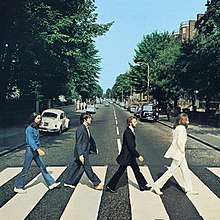Friday, December 29, 2023
Elvis and the Billboard Charts on This Day in History
Saturday, August 26, 2023
"Hey Jude" on This Day in History
Wednesday, October 12, 2022
The Wickedest Man in the World on This Day in History
This day in history: English occultist and ceremonial magician Aleister Crowley was born on this day in 1875. He founded the religion of Thelema, identifying himself as the prophet entrusted with guiding humanity into the Æon of Horus in the early 20th century. Aspects of Thelema and Crowley's thought in general inspired the development of Wicca and, to a certain degree, the rise of Modern Paganism as a whole, as well as chaos magick and some variations of Satanism. Some scholars also believe Thelema to have been an influence on the development of Scientology. The main teaching of Thelema was a similar principle to the one that Crowley had lived by his whole life: “Do what thou wilt.” He would have sex with anyone and would indulge in drugs and all manner of licentiousness. The John Bull periodical labelled him "the wickedest man in the world" and "a man we'd like to hang" especially as he sided with the Germans against his home country of England in World War I.
Crowley was such a depraved individual that even the Fascist government of Italy kicked him out of their country in 1923, especially after the death of a follower due to drinking the poisoned blood of a sacrificed cat. He was also fascinated with Nazism and Communism as these ideologies were the most destructive to Christianity and society as a whole.
Despite all this, Crowley has remained an influential figure, both amongst occultists and in popular culture, particularly that of Britain, but also of other parts of the world. In 2002, a BBC poll placed Crowley seventy-third in a list of the 100 Greatest Britons. He was included as one of the figures on the cover art of The Beatles' album Sgt. Pepper's Lonely Hearts Club Band, and his motto of "Do What Thou Wilt" was inscribed on the vinyl of Led Zeppelin's album Led Zeppelin III. Led Zeppelin co-founder Jimmy Page bought Boleskine (Crowley's house) in 1971, and part of the band's film The Song Remains the Same was filmed on the grounds. He sold it in 1992. Though David Bowie makes but a fleeting reference to Crowley in the lyrics of his song "Quicksand", it has been suggested that the lyrics of Bowie's No. 1 hit single "Let's Dance" (1983) may substantially paraphrase Crowley's 1923 poem "Lyric of Love to Leah". Ozzy Osbourne and his lyricist Bob Daisley wrote a song titled "Mr. Crowley" (1980).
Monday, September 26, 2022
The Beatles Abbey Road Album on This Day in History
Thursday, July 7, 2022
Ringo Starr on This Day in History
Saturday, March 12, 2022
John Lennon's Dark Side on This Day in History
Tuesday, November 16, 2021
The Psychedelic Drug LSD on This Day in History






